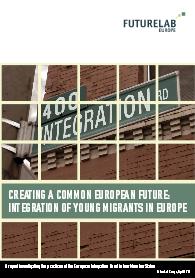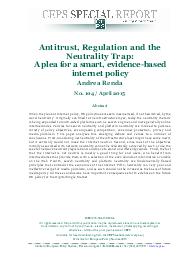Reinhart, Carmen, (2015), “Lessons for Greece: Forcible currency conversions from 1982 to 2015”, Voxeu, 9 Ιουλίου Contrary to the intent of the designers of what was to be an irreversible currency union, Greece may well exit the Eurozone. This column argues that default does not inevitably trigger the introduction of a new currency (or the re-activation of an old one). However, if ‘de-euroisation’ is the end game, then a forcible …Read More
Don’t Blame the Euro: Historical Reflections on the Roots of the Eurozone Crisis
Mourlon-Druol, E., (2014), “Don’t Blame the Euro: Historical Reflections on the Roots of the Eurozone Crisis”, West European Politics, Vol. 37, Issue 6, pp. 1282-1296. The article argues that many of the issues that are causing trouble in the eurozone today had long been debated, but not solved, prior to the beginning of the so-called euro crisis. Three thematic examples are used to show this: the decade-long discussion surrounding economic …Read More
The Euro Crisis’ Theory Effect: Northern Saints, Southern Sinners, and the Demise of the Eurobond
Matthijs, M. & McNamara K., (2015), “The Euro Crisis’ Theory Effect: Northern Saints, Southern Sinners, and the Demise of the Eurobond”, Journal of European Integration, Vol. 37, Issue 2, pp. 229-245. Of the multiple narratives EU policymakers could have chosen at the onset of the euro crisis, why did austerity and structural reform win out over other plausible cures for member states’ problems? Arguably, sovereign debt pooling or more federalized …Read More
Varieties of Capitalism and the Euro Crisis
Hall, P. (2014), “Varieties of Capitalism and the Euro Crisis”, West European Politics, Vol. 37, Issue 6, pp. 1223-1243. This article examines the role played by varieties of capitalism in the euro crisis, considering the origins of the crisis, its progression, and the response to it. Deficiencies in the institutional arrangements governing the single currency are linked to economic doctrines of the 1990s. The roots of the crisis are linked …Read More
Europe’s ordoliberal iron cage: critical political economy, the euro area crisis and its management
Ryner, M., (2015), “Europe’s ordoliberal iron cage: critical political economy, the euro area crisis and its management”, Journal of European Public Policy, Vol. 22, Issue 2, pp.275-294. Orthodox integration scholarship failed to identify the factors leading to the euro area (EA) economic and financial crisis because of weaknesses that Horkheimer identified in ‘traditional’ theory: disciplinary splits and a tendency to idealize from particular instrumental perspectives. By contrast, critical political economy …Read More
Germany’s Institutional Power and the EMU Regime after the Crisis: Towards a Germanized Euro Area?
Steinberg, Fr., Vermeiren Matt., (2015), “Germany’s Institutional Power and the EMU Regime after the Crisis: Towards a Germanized Euro Area?”, Journal of Common Market Studies, 2015, pp.1-20. In this article we examine the constraints on Germany’s influence over reforms of the Economic and Monetary Union’s (EMU) macroeconomic governance regime. Drawing on the insights of historical institutionalism, we show that the German government’s control over the process is constrained by the …Read More
Creating a Common European Future: Integration of Young Migrants in Europe
Creating a Common European Future: Integration of Young Migrants in Europe, A report investigating the practices of the European Integration Fund in four Member States, FutureLab Europe, Απρίλιος 2015. EXECUTIVE SUMMARY: The main purpose of this report is to assess the integration of migrants in the EU by investigating the practice of the European Integration Fund (EIF) in four EU member states: Finland, Germany, Romania, and Spain, virtually …Read More
Antitrust, Regulation and the Neutrality Trap: A plea for a smart, evidence-based internet policy
Renda, A. (2015) “Antitrust, Regulation and the Neutrality Trap: A plea for a smart, evidence-based internet policy, CEPS Special Report Νο. 104, 17 Απριλίου. When they look at Internet policy, EU policymakers seem mesmerised, if not bewitched, by the word ‘neutrality’. Originally confined to the infrastructure layer, today the neutrality rhetoric is being expanded to multi-sided platforms such as search engines and more generally online intermediaries. Policies for search …Read More
The Eurozone crisis and the transformation of EU governance: internal and external implications
Rodrigues, Maria João. & Xiarchogiannopoulou, Eleni. & EBSCOhost. (2014). The Eurozone crisis and the transformation of EU governance: internal and external implications. Farnham, Surrey, UK ; Burlington, VT: Ashgate, 15 Απριλίου. To βιβλίο περιλαμβάνει τα εξής επιμέρους κεφάλαια: Transcending or descending? : European integration in times of crisis / Zoe Lefkofridi & Philippe Schmitter Economic crisis and the internationalisation of EU competition policy / Michelle Cini The transformation of …Read More
The Five Things Everyone Should Know About the European Union
Menon, A. (2015) “The Five Things Everyone Should Know About the European Union“, Social Europe Journal, 08 Απριλίου. Where to start when asked, in five points, to encapsulate an institution as complex, as contested, as frequently misunderstood and indeed as deliberately misrepresented as the European Union? Perhaps with the statement that both its supporters and detractors exaggerate their cases. Rather than being the all-powerful behemoth frequently alluded to by …Read More







